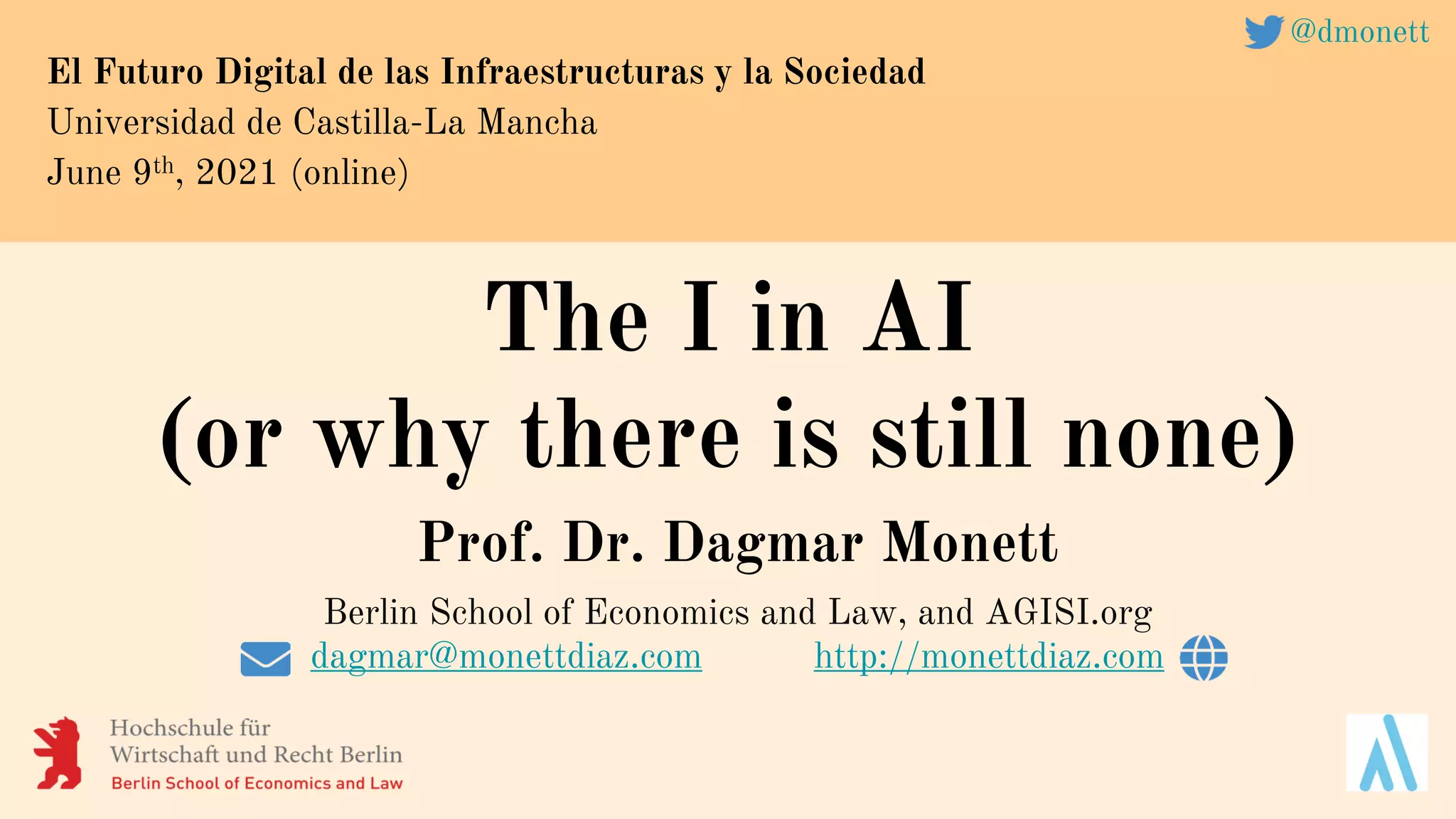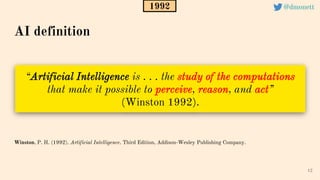The document is a keynote presentation by Prof. Dr. Dagmar Monett discussing the complexities and varied definitions of intelligence, particularly in the context of artificial intelligence (AI). It highlights the historical evolution of the concept of intelligence and reflects on the disagreements and lack of consensus in defining AI. Monett emphasizes the need for a clearer understanding to advance the field and addresses the misconceptions and hype surrounding AI.

![2
@dmonett
How to cite this source:
Monett, D. (2021). The I in AI (or why there is still none). Keynote at the
Webinar “El Futuro Digital de las Infraestructuras y la Sociedad,” Universidad
de Castilla-La Mancha, Spain, June 9th, 2021 [online]. Available at:
https://www.slideshare.net/dmonett/monett-2021-uclm (Accessed: access date)
Note: This is a slightly extended version of the original slides. Slides with the symbol, like this one,
were added after the talk. They include additional related information.](https://image.slidesharecdn.com/monett-9june2021-uclm-keynote-210611103958/85/The-I-in-AI-or-why-there-is-still-none-2-320.jpg)





![[Intelligence is] the power of good responses from the
point of view of truth or facts (Thorndike); the ability to
carry on abstract thinking (Terman); having learned or
ability to learn to adjust oneself to the environment
(Colvin); the capacity for knowledge (Henmon); the
capacity to acquire capacity (Woodrow).
8
As referred to in Lanz, P. (2000). The Concept of Intelligence in Psychology and Philosophy. In Cruse, H., Dean, J., and
Ritter, H. (eds) Prerational Intelligence: Adaptive Behavior and Intelligent Systems Without Symbols and Logic, Vol. 1, 19-30,
Springer.
5 (14) educational psychologists define intelligence
1921 @dmonett](https://image.slidesharecdn.com/monett-9june2021-uclm-keynote-210611103958/85/The-I-in-AI-or-why-there-is-still-none-8-320.jpg)

![“[Intelligence is] the ability to solve hard problems”
(Minsky 1985).
10
AI definition
Minsky, M. (1985). The Society of Mind. Simon and Schuster, New York.
1985 @dmonett](https://image.slidesharecdn.com/monett-9june2021-uclm-keynote-210611103958/85/The-I-in-AI-or-why-there-is-still-none-10-320.jpg)
![[Intelligence is] an elusive concept (Estes); an illusory unified capacity (Horn);
a cognitive proficiency (Glaser); a polymorphous set of qualities elusive to define,
explain, and measure (Brown); a pluralistic (Anastasi), context-dependent con-
cept (Anastasi; Sternberg); a medley of important events, a mixture of different
things (Horn); a finite set of independent abilities operating as a complex system
(Detterman); the sum total of all cognitive processes (Das); a collective
term for demonstrated, mental individual differences (Hunt); mental
self-government (Sternberg); a judgement or attribution that people do,
and not a quality residing in the individual (Goodnow); a hypothetical
(Zigler), culture-bound, ethnocentric, and excessively narrow (Berry),
societal construct, a concept in the mind of a society at large (Carroll).
11
A summary of some of the definitions that are included in Sternberg, R. J. and Detterman, D. K. (1986).
What is intelligence? Contemporary Viewpoints on its Nature and Definition. Norwood, NJ: Ablex.
16 (25) leading psychologists define intelligence
1986 @dmonett](https://image.slidesharecdn.com/monett-9june2021-uclm-keynote-210611103958/85/The-I-in-AI-or-why-there-is-still-none-11-320.jpg)




![“[Artificial Intelligence is] the science and engineering of
making intelligent machines. ... It is related to the similar task of
using computers to understand human intelligence”
(McCarthy 2007).
“Intelligence measures an agent’s ability to achieve goals in a
wide range of environments” (Legg & Hutter 2007).
16
AI definitions
McCarthy, J. (2007). What is Artificial Intelligence? Computer Science Department, School of Engineering, Stanford
University.
Legg, S. and Hutter, M. (2007). Universal Intelligence: A Definition of Machine Intelligence. Minds and Machines,
17(4):391-444, Springer.
2007 @dmonett](https://image.slidesharecdn.com/monett-9june2021-uclm-keynote-210611103958/85/The-I-in-AI-or-why-there-is-still-none-16-320.jpg)



![“There is very great disagreement concerning the concept of intelligence”
(Journal editors 1921).
“[A] substantial disagreement on a single definition still abounds”
(Detterman 1986).
“It is a testimony to the immaturity of our field that the question of what we
mean when we talk about intelligence still doesn’t have a satisfying answer”
(Chollet 2019)
20
Journal editors (1921). Intelligence and Its Measurement: A Symposium. Journal of Educational Psychology, Vol 12(3), 123-
147.
Detterman, D. K. (1986). Qualitative Integration: The Last Word? In R. J. Sternberg and D. K. Detterman (eds.), What is
intelligence? Contemporary Viewpoints on its Nature and Definition, pp. 163-166. Norwood, NJ: Ablex.
Chollet, F. (2019). The Measure of Intelligence. arXiv:1911.01547 [cs.AI].
No consensus definition (i)
@dmonett](https://image.slidesharecdn.com/monett-9june2021-uclm-keynote-210611103958/85/The-I-in-AI-or-why-there-is-still-none-20-320.jpg)
![21
“[The concept of artificial intelligence] is aspirational, a moving target based on
those capabilities that humans possess but which machines do not” (Lipton 2018).
“[I]t shifts with technological advances and our expectations from computers.
That’s why it’s pretty hard to determine what is or isn’t AI” (Dickson 2019).
No consensus definition (ii)
Lipton, Z. C. (2018). From AI to ML to AI: On Swirling Nomenclature & Slurried Thought. Approximately Correct:
Technical and Social Perspectives on Machine Learning. http://approximatelycorrect.com/
Dickson, B. (2019). 5 European companies that are (really) advancing AI. The Next Web. https://thenextweb.com/
● Still no consensus definition of (A)I
● Very polarized concept
● Interdisciplinarity, different contexts and
applications
● Misleading news and hype around AI damaging the
field
● Need to know the boundaries of the discourse
@dmonett](https://image.slidesharecdn.com/monett-9june2021-uclm-keynote-210611103958/85/The-I-in-AI-or-why-there-is-still-none-21-320.jpg)






![“The long-term dream of AI is to build
machines that have the full range of
capabilities for intelligent actions that
people have—to build machines that are self-
aware, conscious and autonomous in the
same way that people like you and me are.
[...] The reality of AI for the foreseeable
future is very different to the grand dream.”
(Wooldridge 2020).
28
Wooldridge, M. (2020). The Road to Conscious Machines: The Story of AI. UK: Pelican Random House.
2020 @dmonett](https://image.slidesharecdn.com/monett-9june2021-uclm-keynote-210611103958/85/The-I-in-AI-or-why-there-is-still-none-28-320.jpg)




![33
“[C]ellular structure
of the rodent
hippocampus, a
region of the brain
involved in learning,
memory, and sensory
integration.”
Brainbow Hippocampus
Greg Dunn and Brian Edwards,
2014, www.gregadunn.com
A complex
reality](https://image.slidesharecdn.com/monett-9june2021-uclm-keynote-210611103958/85/The-I-in-AI-or-why-there-is-still-none-33-320.jpg)
